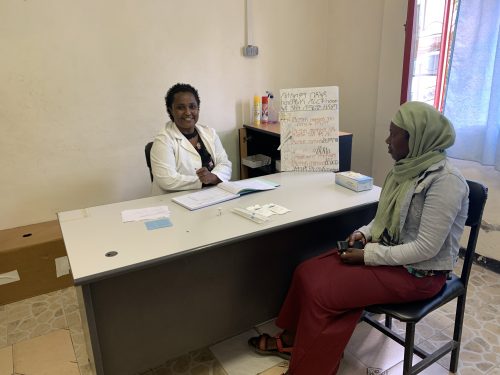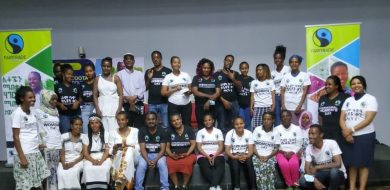In a nutshell Diversity & Inclusion is about empowering people by respecting and appreciating what makes them different, in terms of age, gender, ethnicity, religion, disability, sexual orientation, education, and national origin. At Sher Ethiopia we are proud to offer various programmes and training courses to our staff and community members that demonstrate our commitment to a diverse and inclusive workforce.
The Fairtrade Africa WSOL initiative aims at ‘promoting gender equality, inclusion and empowerment of women as well as youth and persons living with disabilities’ through establishment of change agents/gender equality champions. This is achieved through Training of Trainers (ToTs), Coaching, Mentorship and Peer to Peer learning approaches for 10 modules which encompass major topics including human rights and gender equality promotion, financial literacy and entrepreneurship, diversification of income, women and leadership skills development. One of the aspects teaches women how they can manage and expand their own income generating activities. Participants in the WSOL are given a seed capital to begin the income generating activity which should mostly benefit low income earners and women with disability.
Starting in 2019, the project has now seen three cohorts of flower workers graduate from the Women’s School of Leadership, having completed training modules that have supported women to become leaders at work and in their communities through mentorship, upskilling, and behaviour change initiatives.
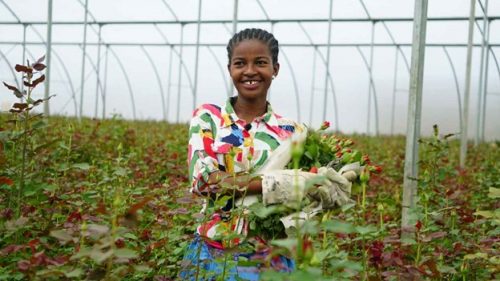
As part of the school program, eight Incoming Generating Activity groups have been established, supporting women to complete business plans and diversify their incomes. Addis Petros, a former harvester at Sher Ethiopia, graduated in 2019, says: “The leadership course taught me that you only need to have the desire to learn. With interest, you can learn and grow in different areas without compromising any part of your life”.
At Sher Ethiopia inclusion of employees with disabilities has always been a priority. Nevertheless, we are grateful that the Dignity for All program (D4A) of Fairtrade Africa, has supported 116 disabled employees with devices to enable them to work more comfortable. In this project Sher Ethiopia and Fairtrade Africa teamed up with Gerarbet Rehabilitation Association, located in Ziway, to carry out the measurements for the beneficiaries to determine the kind of device required and the proper fitting of the devices. These include a.o. tricycles, crutches, artificial limbs, eyeglasses, and hearing devices. We are grateful that five employees are willing to share their personal stories.
My name is Wubenesh Takele. I am 22 years old and I come from Woleita Sodu area. I started at Sher in 2018. My work is to measure and arrange cartons that protect the flowerbuds. This is a job that I can do while sitting down. The problem with my leg started when I was 6 years old. Ever since it has been difficult for me to walk. The prosthetic leg provided by Fairtrade makes it a lot easier to walk. It has really changed my life for the better.
Mohammed Kedir
My name is Mohammed Kedir. My age is 42 and I started working at Sher in 2009. In my time in the military service I was hit by a bullet. That's why I have one artificial eye. For my other eye, the vision was slowly getting worse. Thanks to Fairtrade I now have two types of glasses. One for reading and one for the sun. This makes me much more confident about my job as a security guard.
Selamawit Haile
My name is Selamawit Haile, 22 years old. I have been in service since 2018. I came from Shone (Sashemane) area together with my sister to work for Sher. We also live together. My job is to bunch roses. As a child I broke my leg. One leg is shorter than the other. With the custom-made shoes that I received from Fairtrade I can walk much more balanced. It is a big improvement and they look nice too.
Mude Balcha
My name is Mude Balcha, 47 years. Originally I am from Arba Minch. In 2016 I came to Ziway to look for a job. I became a recorder at Sher. As a child I suffered from polio. This affected my right leg which is shorter. With the custom made soles that I received I can even play football. My wife also works at a rose farm.Together we are able to send our children to University and High School back in Arba Minch where they live with their uncle.
Addis Tadesse
My name is Addis Tadesse, 21 years. I joined Sher in 2019. As a first aid I like to help my colleagues. Originally I am from Arsi Begoji. When I was 2 years old I had a thorn in my foot. This led to an infection and as a result one leg is a bit shorter than the other. The special soles and shoes that I got from Fairtrade make it so much easier for me to walk. I recently got a diploma in accounting and I will continue to get a degree. I hope to get an office job one day.
Micro and small scale enterprises (MSE) coupled with institutional support such as good market access, provide a useful strategy to create jobs for jobless and reduce poverty. At Sher Ethiopia we purchase supplies from 19 different local micro-enterprises, creating market linkage to over 250 people. A very nice example is the business Y.K. in Adami Tulu run by 8 individuals (3 men and 5 women), represented by Jonny Bune and Kedir Ararso. In 2019 the group was formed and the business started with the supply of sand, gravel, stone and red ash to the construction department of Sher Ethiopia. On average Y.K. deliver 17 trucks of material per month. Kedir says: ‘Over the past years we have gradually learned how to do business. Our negotiation skills have improved so now we are even trying to get a tender from the government to supply materials to extend our business. Behind our group of 8 people are an extra 22 family members. So in total 30 people benefit from the business we get from Sher Ethiopia. With the money earned we want to start building our own houses’.
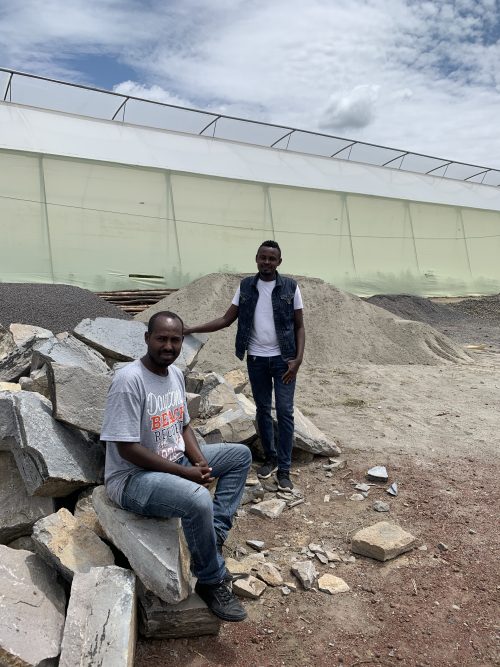
We have developed and implemented different policies to ensure Gender Equality and to safeguard the rights of women. These policies include among others: sexual harassment, non discrimination, equality & diversity and maternity leave & breastfeeding. As an example, the nursing mother policy is explained here:
‘My name is Abaynesh Hussein, 25 years old. I started working at Sher Ethiopia in Adami Tulu 3 years ago. I am a greenhouse harvester. My husband works in the irrigation department of Sher Ethiopia. Together we have two children, 3 and almost 1 year old. Sher offers a paid maternity leave of 4 months. Adding my annual leave days I was able to stay home for 5 months when my children were born. Until the baby is one year old I have a right to two hours of paid breastfeeding-leave per day. So every day I go home at 11:00 and return at 13:00 to breastfeed my baby. This break is including a one hour lunch break. Then at 15:00 hours my workday is finished, one hour before everybody else, and I can go home to my children. During the day my mother takes care of my children so I am able to generate an income. When the oldest child is 4 years old I will register her at the Sher school, free of charge. That’s another advantage when working for Sher’.
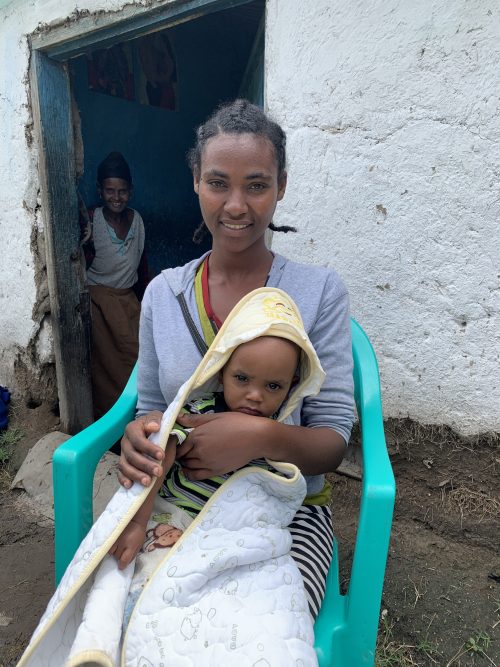
To educate employees on different diversity and inclusion topics, we use peer educators. Peer education is the teaching or sharing of health information, values and behavior in educating others who may share similar social backgrounds or life experiences. The peer educators receive several training sessions throughout the year and teach our staff on a voluntary basis. We have asked two of them to tell about their experiences. One of them is Bodode Kilto. A proud young lady of 26 years with an impressive story:
‘Being born and raised in Adami Tulu I started at Sher almost 9 years ago as a carton organizer. After my first year I was able to get medical treatment for my disability. When I was 15 years I had polio and my leg became real thin. Since then I had to walk with crutches. Luckily I found a job at Sher Ethiopia. In 2017 I was given a job in the quality department. I became a Quality Controller. I am a member of the Gender Committee and a member of the Health and Safety Committee. Despite my disability, I have been given great opportunities at Sher. I really like to educate my colleagues on all kind of topics, especially on awareness of disabled people. Recently I got a prosthetic leg through the Fairtrade Dignity for all program. Now, since a very long time, I can walk without crutches. I am very happy and proud. Recently I got married, I feel really blessed’.
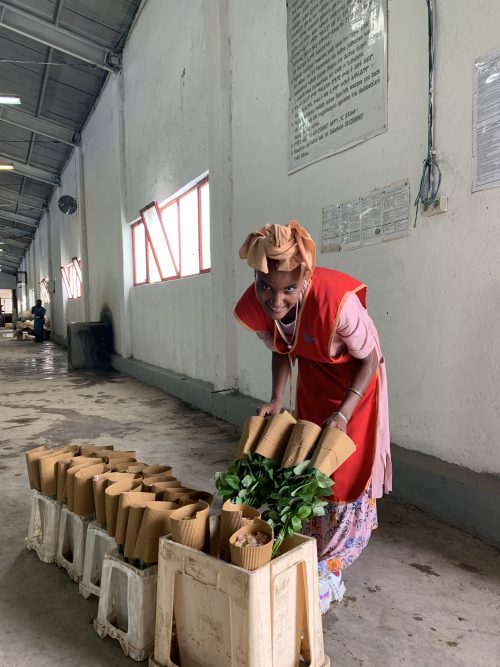
Another peer educator is Yerusalem Beyenne, 28 years old:
‘I started at Sher in 2013. I worked in several positions: 2 years as a general worker, 2 years a s a timekeeper and the last 4 years as a storekeeper. Originally I am from the Wonji area. I have a 8 year old son. As a peer educator we regularly get internal and external trainings on several topics like gender equality, women empowerment and family planning. Once a week we organize a training for our colleagues in groups of 25 up to 50 people. During lunchtime we try to pass on what we have learned. I like it when I see people change and make the right decisions in life. All this knowledge has made me a much more confident and courageous woman. Take for instance the computer skill training provided by the Fairtrade Premium Committee. Last year I joined the training for 6 months. Recently I signed up for a 3 year computer science program at college’.
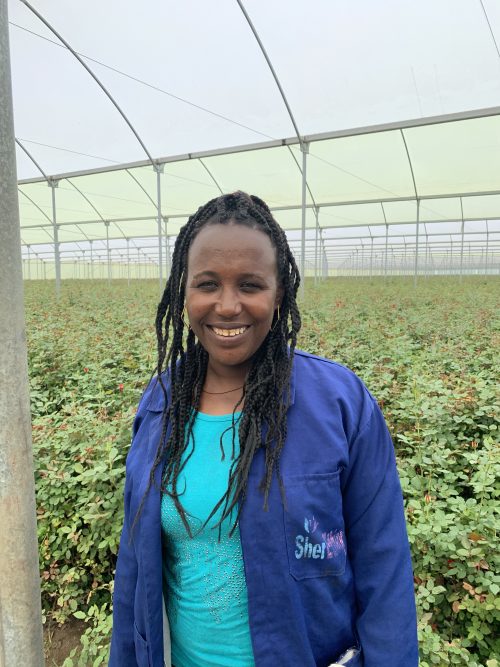
Another very important topic is family planning and prevention of HIV Aids. Peer educator Bessa Ipsa (33 years) is one of our employees that uses her own story to educate others:
‘Originally I come from Arsi. I have lived in Ziway for almost 20 years now. In 2014 I started working for Sher Ethiopia. The first 6 months as a security guard, then 2 years as a sub-store manager. Since 2017 I work as a Storekeeper for one of the main stores. 5 years ago I joined the Gender Committee. I teach my colleagues about the importance of wearing proper PPE, hygiene and family planning. I know from my own experience that getting married at a young age is a burden. I got married when I was 13 years old. I had my first child when I was 14 years old. My first born is in university now. The second one is in grade 12 of Sher school. I call my third child the baby of love, he is in grade 2 now. Luckily I am married to a nice man. After I got my first two children I went back to school. After grade 8 it took three years of daytime education to get my diploma in accounting. Combining an education and raising children was a tough time. But I am happy I pushed through. My ambition is to go back to school again. As soon as my second child goes to university, I want to get a degree in accounting. I tell all the young girls to finish their education first before they start a family. And to protect yourself from sexual harassment and HIV Aids. Awareness on these topics is very important. I am proud to tell my story and I am happy I can contribute to the awareness of others’.
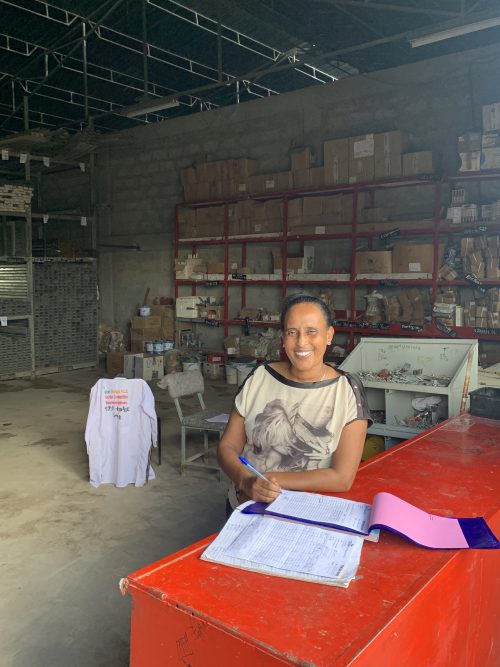
Educating our staff on reproductive health is extremely important. In a country where the average age is 19.8 years and the total population is nearly 115 million, birth control is key. Nurse Chaltu Worana (38) knows all about this: ‘I have been working for Sher Ethiopia since 2014. I have a diploma as a midwife and worked at Sher Hospital for 7 years. In 2020 I was assigned on the farm as a company nurse. In the morning I visit the greenhouses and gradings where I examine employees that report sick. In the afternoon my office is open for private consultation and I talk to a lot of employees about family planning, birth control, sexual diseases and unwanted pregnancies. Through mass education and awareness training we try to bring knowledge to the workers. In the peer educator program I train the trainers and we are able to reach a lot of our colleagues. Over the past year we have been very successful in convincing young girls to take birth control measures. At Sher Hospital we also give counselling to HIV Aids patients and cervical cancer screenings for all women between 30-50 years’.
